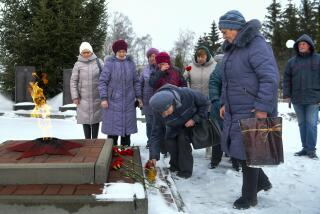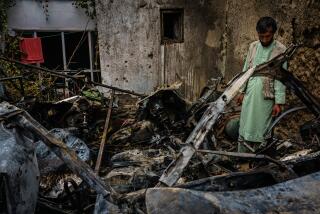U.S. Pilots Won’t Testify in British Deaths
- Share via
LONDON — U.S. Ambassador Raymond Seitz on Tuesday rejected a request by the families of nine British servicemen killed by American aircraft “friendly fire” in the Persian Gulf War that U.S. pilots testify at an inquest in Britain.
Two U.S. Air Force A-10 aircraft accidentally struck two British Warrior armored personnel carriers during the military advance into Iraq on Feb. 26, 1991, killing the soldiers.
Seitz told the soldiers’ relatives that it would serve no useful purpose to bring the pilots to Britain and that any hearing involving them could turn into a media circus.
Britain’s tabloid press has been dramatizing the story, calling for the pilots to appear at a coroner’s inquest, which began last week in Oxford at the request of the victims’ families. The papers have printed detailed coverage of the hearing, including accounts from soldiers who survived the attack.
“This is a very unhappy, tragic event,” Seitz said after meeting the mothers of two of the slain soldiers in Birmingham. “I know there is a wish that the pilots come here. We have taken the position that they will not. It becomes daily more obvious that this is the correct decision.”
The relatives have complained that they were given conflicting statements by the British Defense Ministry and by the U.S. Defense Department as to how the accidental deaths occurred. Their lawyers have referred to “staggering discrepancies” between the two official accounts.
British defense sources conceded privately that the affair in its early stages was mishandled, that officials should have dealt more frankly with the survivors.
But both U.S. and British defense officials argue that producing the pilots in court would only open wounds and shed no additional light on how the accident occurred.
During the Tuesday meeting, Seitz asked the families to spare a thought for the feelings of the American pilots, saying that to appear in court would only “compound” their grief over having accidentally killed nine of their allies.
On Monday, the families sent an open letter to British Defense Minister Malcolm Rifkind and asked him to take up the matter with U.S. Defense Secretary Dick Cheney during Rifkind’s current trip to Washington.
Barbara Thompson, whose 19-year-old son was among the dead, called the White House to try to overcome U.S. objections to having the pilots testify in person.
The Defense Department submitted a 25-page document containing statements from the pilots and others involved, indicating that other U.S. planes in the area--on a clear day--had flown over British troops without mistaking their vehicles for Iraqi forces.
The A-10 “tank-buster” pilots said they saw a group of armored vehicles and were told by spotter planes that they were Iraqi tanks. Seeing no allied markings on the vehicles, they said, they launched their air-to-ground Maverick missiles, knocking out two Warriors.
The British ground troops have maintained that their vehicles were marked with fluorescent panels for ready identification.
In the document presented to the court, a Pentagon official wrote: “We reiterate our deep compassion for the families of these courageous soldiers who died defending the cause of freedom. We want all to know that we regret this tragic occurrence.”
The major discrepancy between the British and American versions of the incident involves what the pilots were told about their targets.
According to the Americans, as they bore down on what they believed to be advancing Iraqi tanks, they received nothing more than a broad visual description of the target from a British liaison officer. His description, they say, was similar to the cluster of British vehicles they fired upon. They also said he did not provide them with a precise location.
The British officer has testified to British and American authorities that he remembers passing the exact coordinates of the intended targets--a cluster of Iraqi armored vehicles--to the American airmen.
The Oxford coroner’s jury, which is expected to begin deliberations at the end of the week, will determine the circumstances of the deaths but will not assign blame.
Times staff writer Melissa Healy in Washington contributed to this article.
More to Read
Sign up for Essential California
The most important California stories and recommendations in your inbox every morning.
You may occasionally receive promotional content from the Los Angeles Times.













